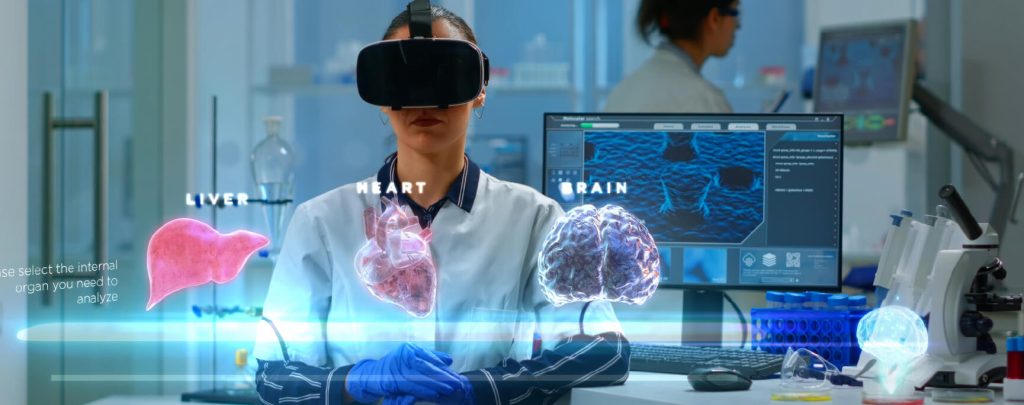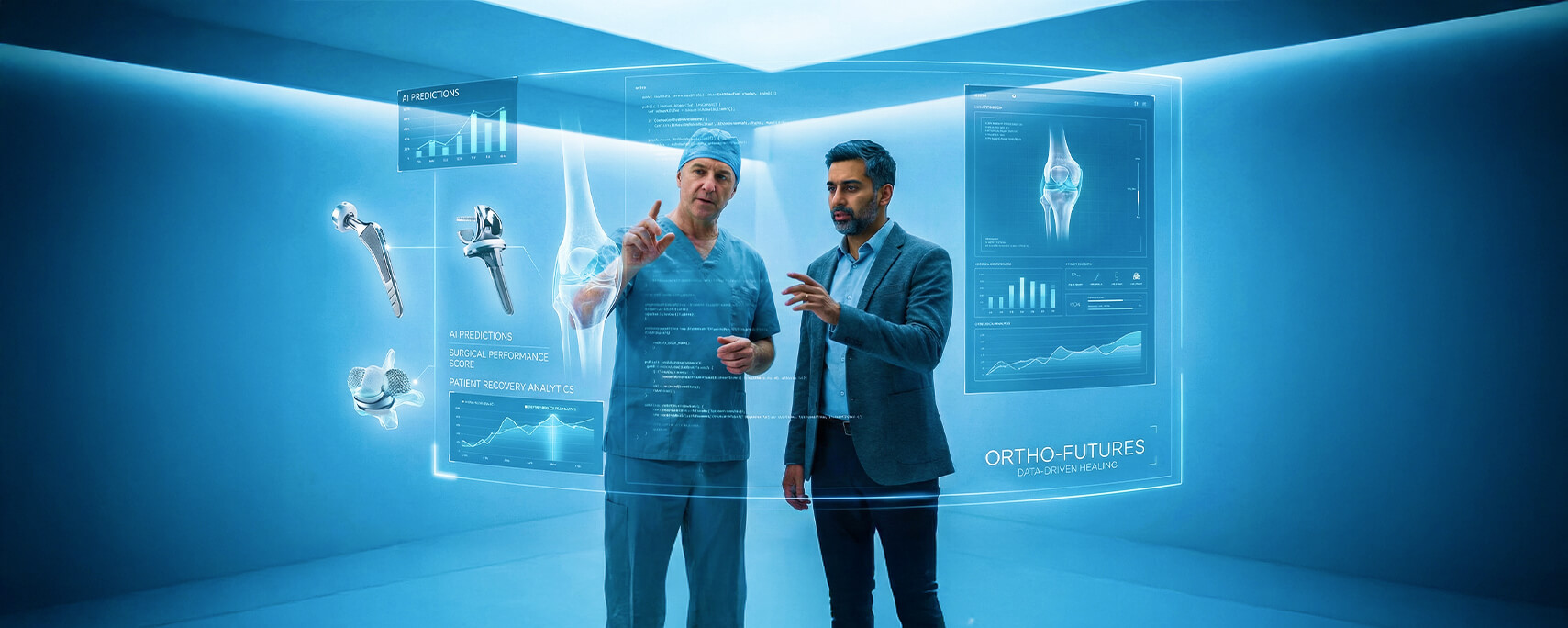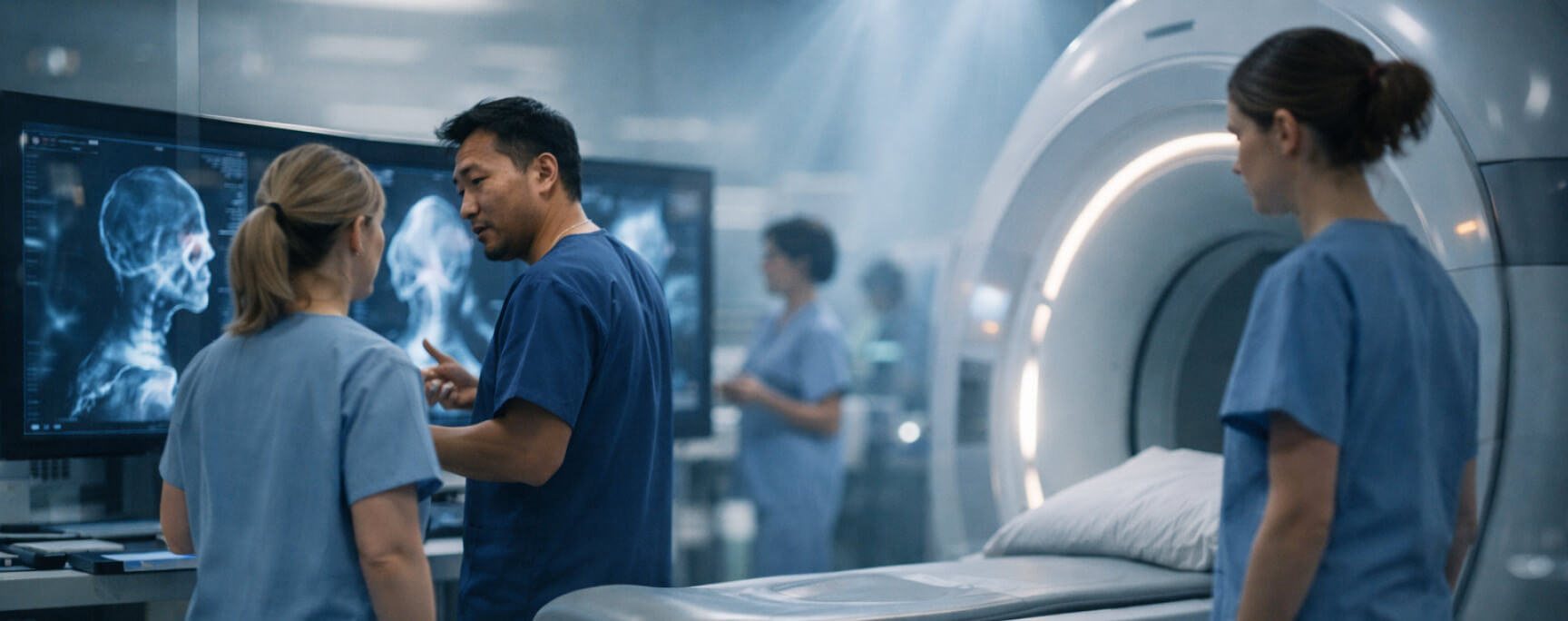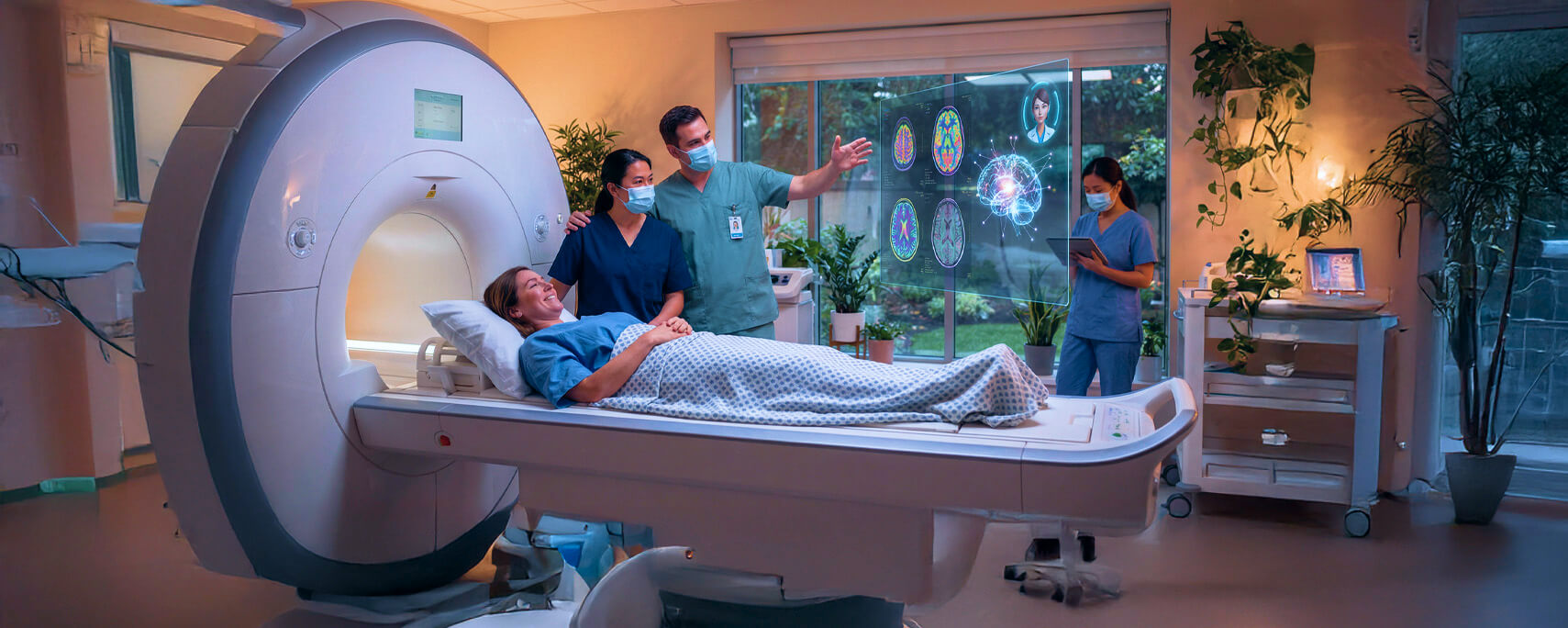AI in Medical Devices: Transforming Healthcare with Smart Solutions
AI in medical devices enhances clinical technology by enabling real-time signal analysis and timely responses. These devices assist care teams to improve outcomes and adapt as healthcare evolves.
This blog will present an overview, key applications, challenges, and future trends, and how this technology is revolutionizing the healthcare sector.
AI and Medical Device: An Overview
AI in medical devices means using artificial intelligence to enhance medical tools and systems. This includes many applications, like imaging machines that help doctors find diseases early. It also addresses diagnostic equipment that evaluates patient risk and recommends treatments. Deep learning and machine learning are crucial in these developments.
Medical equipment uses AI algorithms like neural networks and deep learning in both hardware and software. In hardware, AI helps imaging machines interpret scans and find issues like tumors. In software, AI analyzes patient data. It forecasts outcomes, identifies trends, and recommends individualized treatments. This is intended to make devices smart and precise, allowing clinicians to deliver improved care.
AI Applications Transforming Healthcare Devices
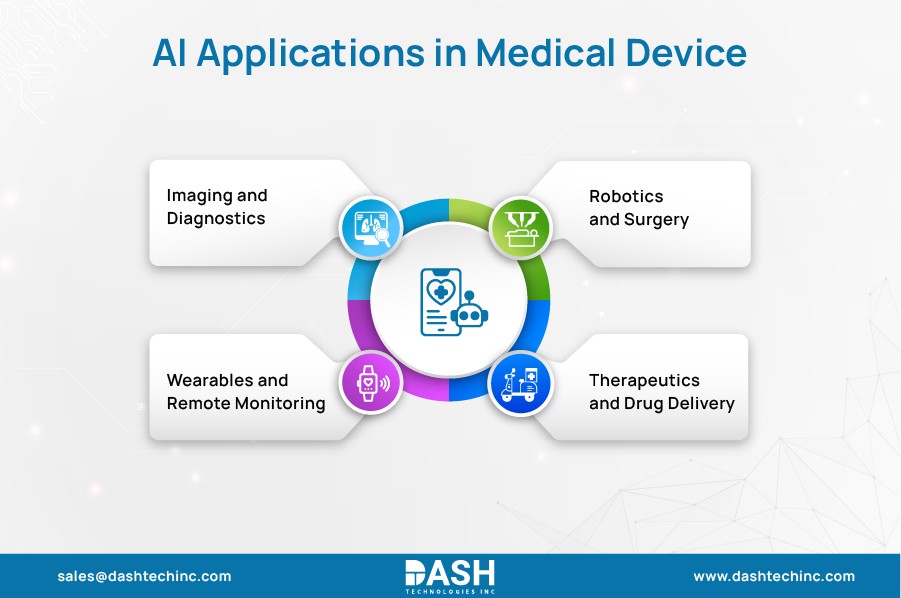
AI technology in healthcare devices has key applications that are advancing the field. These innovations improve accuracy, efficiency, and personalization in patient care.
- Imaging and Diagnostics
Convolutional neural networks (CNNs) and attention-based models analyze CT, MRI, and PET scans in real time, detecting abnormalities related to cancer, stroke, or neurodegeneration with high accuracy.
In digital pathology, AI platforms examine gigapixel whole-slide images. They automate tumor grading, detect mitotic figures, and quantify biomarkers. Researchers test these systems on large, annotated data sets. They connect to clinical processes through DICOM-compatible interfaces.
- Wearables and Remote Monitoring
Wearables use onboard machine learning, including LSTM networks, to process biosignals like ECG, SpO₂, and glucose in real time without constant cloud access. Data from these devices goes into predictive analytics platforms. This supports remote clinical interventions and ongoing care.
- Robotics and Surgery
Robot surgery systems use reinforcement learning, computer vision, and sensor fusion. These tools help with semi-autonomous tasks. These tasks include suturing, tissue classification, and trajectory planning.
Real-time decision support systems analyze data during surgery. They help adjust tool movement, locate anatomical landmarks, and avoid injuries. Embedded processors enable this functionality. This requires stable execution. So, real-time operating systems (RTOS) and high-performance firmware are essential.
- Therapeutics and Drug Delivery
AI analyzes patient responses to personalize drug delivery, adjusting dosages in real time based on physiological data. Closed-loop infusion pumps and implantable devices use adaptive control methods. They gather sensor feedback without interruption to improve therapy.
Often, these systems use reinforcement learning agents trained in simulations. This helps balance drug effectiveness and cut side effects.
The Role of AI in Personalizing Patient Care
AI is changing patient care with real-time data and forecasting algorithms. These tools help personalize treatment decisions. Implantable devices track signals such as heart rate, blood glucose, and breathing rate.
AI-enabled insulin pumps perform ongoing analysis of glucose patterns. They adjust doses every minute. A study in The New England Journal of Medicine showed that closed-loop systems helped type 1 diabetes patients maintain their target glucose levels with greater consistency.
Medical device software adheres to standards like IEC 62304 and ISO 14971 to ensure safe, data-driven care using AI. These standards ensure safety, reliability, and performance in patient care. AI enhances clinical judgment instead of replacing it. It offers scalable, real-time insights designed for each patient’s needs.
Build AI-Driven Intelligent Healthcare Solutions
Empower diagnostics, remote monitoring, and personalized care through smart, compliant medical device software.
Explore SolutionsNavigating Challenges in AI-Driven Medical Devices
AI in medical device brings several challenges, despite progress. Regulators such as the FDA develop frameworks to address AI algorithms that adapt over time, since traditional approvals don’t fully apply. There is a need to adopt new models, such as the FDA’s Total Product Lifecycle approach. Vendors must show initial safety and effectiveness. They also need to prove ongoing algorithm performance during updates.
Data privacy is a significant issue. AI devices base their actions on the real-time data they gather from patients. It brings up concerns about consent, security, and data governance. Securing patient data while allowing predictive analytics is a challenging task.
Ethical issues are important too. They focus on accountability for AI decisions and bias in algorithms. It’s important to address these. It ensures the trust of patients in AI solutions in healthcare.
Dash Transforms Surgical Efficiency with Intelligent OR Solutions
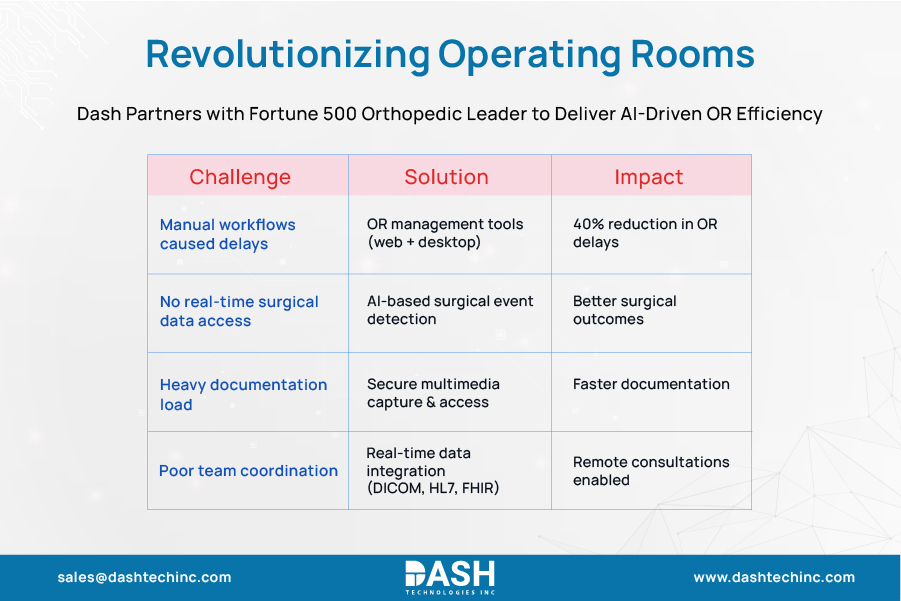
A Fortune 500 orthopedic solutions leader teamed with DASH to develop an AI-powered operating room system. The solution substituted human workflows with data-driven, automated tools for improved surgical decision-making.
Problem:
Manual interactions during the OR caused inefficiencies and delays. Hospitals required a solution that would digitize surgery workflows, support real-time communication, and enhance the patient experience.
Solution:
- Developed integrated desktop and web-based tools for OR management
- Enabled AI-powered object recognition for surgery event detection
- Provided secure multimedia access and hospital data analytics
- Ensured compliance with DICOM, HL7, and FHIR standards
Impact:
The solution improved OR efficiency. It also allowed remote consultations and let guardians watch surgeries live. AI automation made surgeries smarter and enhanced data security with HL7 FHIR.
Read the full case study to explore how AI-driven tools transformed surgical workflows and patient care.
The Future of AI in Healthcare Device
AI in medical devices is driving toward greater connectivity and autonomy, with some designed to operate without human intervention. This includes surgical robots and closed-loop therapy systems. These devices can operate without real-time human help. They rely on AI models that analyze complex clinical data and make precise decisions.
AI working alongside the Internet of Medical Things (IoMT) is reshaping how connected healthcare systems operate and deliver care. Devices share continuous patient data over secure networks. This helps AI algorithms identify patterns, predict health risks, and trigger early interventions. Such connectivity promotes more proactive care, reducing emergency interventions and hospital stays.
According to Medical Buyer, the global market for AI and ML in medical devices will hit USD 52.09 billion by 2030. This reflects strong growth in the sector. AI and machine learning used in devices, including Software as a Medical Device (SaMD), are required to meet regulatory standards. These rules ensure safety, performance, and compliance during development.
Conclusion
AI is changing how healthcare providers make and track clinical decisions in care settings. It enhances everything from diagnostic testing to personalized therapy. The use of AI in medical devices focuses on automation, accuracy, and real-time adjustments for each patient. These features help healthcare teams improve treatment planning and delivery.
Dash Technologies backs this change by developing scalable and compliant solutions. These solutions meet real clinical needs. Contact us to discover how AI can drive innovation in your healthcare systems.
About Dash

Dash Technologies Inc.
We’re technology experts with a passion for bringing concepts to life. By leveraging a unique, consultative process and an agile development approach, we translate business challenges into technology solutions Get in touch.
